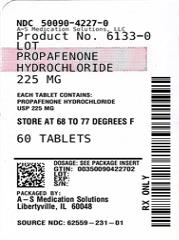Nutrients from the food that you eat passes to your breast milk. Its good idea to take healthy diet while breastfeeding. You may need to consume more calories per day to support healthy body system. Some time it gets necessary take medicine while you are breastfeeding and as other food items passes into breast milk, medicine passes as well hence it becomes obvious to understand its effects while breastfeeding. We have analyzed many medications and in this sheet we will present some fact and known information associated with Propafenone Hydrochloride Tablet while breast-feeding.
What is Propafenone Hydrochloride Tablet used for?
Propafenone Hydrochloride Tablets are indicated to: •prolong the time to recurrence of paroxysmal atrial fibrillation/flutter (PAF) associated with disabling symptoms in patients without structural heart disease. •prolong the time to recurrence of paroxysmal supraventricular tachycardia (PSVT) associated with disabling symptoms in patients without structural heart disease. •treat documented ventricular arrhythmias, such as sustained ventricular tachycardia that, in the judgment of the physician, are life-threatening. Initiate treatment in the hospital. Usage Considerations: •The use of Propafenone Hydrochloride Tablets in patients with permanent atrial fibrillation (AF) or in patients exclusively with atrial flutter or PSVT has not been evaluated. Do not use Propafenone Hydrochloride Tablets to control ventricular rate during AF. •Some patients with atrial flutter treated with propafenone have developed 1:1 conduction, producing an increase in ventricular rate. Concomitant treatment with drugs that increase the functional atrioventricular (AV) nodal refractory period is recommended. •The use of Propafenone Hydrochloride Tablets in patients with chronic atrial fibrillation has not been evaluated. •Because of the proarrhythmic effects of Propafenone Hydrochloride Tablets, its use with lesser ventricular arrhythmias is not recommended, even if patients are symptomatic, and any use of the drug should be reserved for patients in whom, in the opinion of the physician, the potential benefits outweigh the risks. •The effect of propafenone on mortality has not been determined [see Boxed Warning]. Propafenone Hydrochloride Tablets are an antiarrhythmic indicated to: •prolong the time to recurrence of symptomatic atrial fibrillation (AF) in patients with episodic (most likely paroxysmal or persistent) AF who do not have structural heart disease. (1) •prolong the time to recurrence of paroxysmal supraventricular tachycardia (PSVT) associated with disabling symptoms in patients who do not have structural heart disease. (1) •treat documented life-threatening ventricular arrhythmias. (1) Usage Considerations: •Use in patients with permanent atrial fibrillation or with atrial flutter or PSVT has not been evaluated. Do not use to control ventricular rate during atrial fibrillation. (1) •In patients with atrial fibrillation and atrial flutter, use Propafenone Hydrochloride Tablets with drugs that increase the atrioventricular nodal refractory period. (1) •Because of proarrhythmic effects, use with lesser ventricular arrhythmias is not recommended, even if patients are symptomatic. (1) •The effect of propafenone on mortality has not been determined. (1)
Propafenone Hydrochloride Tablet while breastfeeding safe or not? Can there be any side effects for infant while using it during breastfeeding?
Propafenone Hydrochloride Tablet contains only one active ingredient that is Propafenone hydrochloride. We have analyzed the usage of Propafenone hydrochloride in breastfeeding and our analysis suggest that Propafenone hydrochloride poses Low risk for infant while breastfeeding and hence Propafenone Hydrochloride Tablet itself shall be considered Low risk item for breastfeeding.
Propafenone Hydrochloride Tablet Breastfeeding Analsys
Low RiskCAS Number: 54063-53-5
We are working on a comment for this product.
Propafenone Hydrochloride Tablet Breastfeeding Analsys - 2
CAS Number: 54063-53-5
Limited information indicates that maternal doses of propafenone up to 900 mg daily produce low levels in milk. If propafenone is required by the mother it is not a reason to discontinue breastfeeding. Until more data become available, propafenone should be used with caution during breastfeeding, especially while nursing a newborn or preterm infant.
I am nursing mother and I have already used Propafenone Hydrochloride Tablet, what should I do?
During whole lactation period you shall first discuss with your doctor and then together you shall decide whether you shall take that drug or not however if you have already taken Propafenone Hydrochloride Tablet then you shall inform your doctor, But you should not be worried too much as Propafenone Hydrochloride Tablet comes in category of low risk drug.
I am nursing mother and my doctor has suggested me to use Propafenone Hydrochloride Tablet, is it safe?
Propafenone Hydrochloride Tablet comes in category of low risk and if your doctor is aware that you are breastfeeding it should be ok to use without much concerns.
If I am using Propafenone Hydrochloride Tablet, will my baby need extra monitoring?
Not much
Who can I talk to if I have questions about usage of Propafenone Hydrochloride Tablet in breastfeeding?
US
National Womens Health and Breastfeeding Helpline: 800-994-9662 (TDD 888-220-5446) 9 a.m. and 6 p.m. ET, Monday through Friday
UK
National Breastfeeding Helpline: 0300-100-0212 9.30am to 9.30pm, daily
Association of Breastfeeding Mothers: 0300-330-5453
La Leche League: 0345-120-2918
The Breastfeeding Network supporter line in Bengali and Sylheti: 0300-456-2421
National Childbirth Trust (NCT): 0300-330-0700
Australia
National Breastfeeding Helpline: 1800-686-268 24 hours a day, 7 days a week
Canada
Telehealth Ontario for breastfeeding: 1-866-797-0000 24 hours a day, 7 days a week


